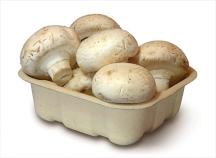Mars landing purchase of Wrigley
Tyson to drop “antibiotic-free” advertising
UK waste culture sparks concern
Dinty Moore goes microwaveable
Mushrooms in compostable trays
Organic show features packaging innovations

by Pan Demetrakakes
Executive Editor
Prices for organic milk and food are starting to rise steeply, a phenomenon that will test consumers’ loyalty to a market that up to now has been a roaring success.
Organic products have always been expensive, retailing for 20% to 100% more than non-organic equivalents. Up to now, that price premium has not hindered growth: The U.S. market for organic food and beverages was $16.7 billion in 2006, a 126% increase in five years, according to the Organic Trade Association. Organics now account for 2.8% of the U.S. food and beverage market.
However, there are signs that the bloom is off the organic rose. Two years ago, 54% of respondents to a survey byWSL Strategic Retailsaid that organic products are good for them and for the environment. In the latest such poll, 48% said they believe organic products are good for the environment, and 45% said organics are good for them.
In part, the backlash over organics is part of the larger consumer reaction to climbing food prices in general. Paradoxically, the organic market has been buffered up to now from rising prices by two factors. Consumers have been accustomed to paying high prices for organic products, so regular organic consumers are likely to be more affluent and insulated from sticker shock. And milk, the second-largest category (behind produce) in organics-and the basis for other organic products like cheese and yogurt-has been protected against price rises by a complex pricing structure. A rule change by the federal government tightening the standards for organic milk led to a temporary glut last year, as dairy farmers rushed to get milk into the system before the new rules went into effect. This caused the price to actually fall slightly while regular milk rose about 60%.
But the glut is over now, and organic milk farmers find themselves in a bind. Because most of them work under long-term contracts, they can’t respond as quickly as regular milk producers to rising prices for feed, fuel and other supplies. Organic Valley, the second-largest U.S. producer of organic milk, raised its prices 4.3% at the beginning of this year and another 4% in March.
Organic prices probably won’t be going down anytime soon. As prices spike for non-organic grains, farmers have less incentive to undergo the expensive and time-consuming transition to organic grain. This will lead to a shortage of organic feed, which will drive up prices for organic products across the board.
“In the last three months or four months, everyone along the chain in organic food is not making their margins,” Bob Eberly, president of Eberly Poultry in Stevens, Pa., toldThe New York Times.
This will be a severe test of consumer loyalty to organic products. The organics industry as a whole will have to both stabilize the price structure and continue to educate consumers as to the benefits of organic products, though marketing that includes effective use of packaging graphics.
Top Developments
Mars landing purchase of WrigleyMars Inc. is buying Wm. Wrigley Jr. Co. in a deal valued at $23 billion. The purchase price will give shareholders $80 per share, a premium of 28% over Wrigley’s closing price of $62.45. The deal, financed by Goldman Sachs, J.P. Morgan and Berkshire Hathaway CEO Warren Buffett, is expected to close in the next six to 12 months, making Wrigley a private company.
Tyson to drop “antibiotic-free” advertising
Effective May 1, Tyson Foods can no longer advertise its chickens as “raised without antibiotics” due to its chicken feed containing ionophores, an additive classified by the United States Dept. of Agriculture as an antibiotic that poses little or no risk in humans. Tyson had tried to use the phrase “Raised without antibiotics that impact antibiotic resistance in humans.” This wording satisfied the USDA, but several Tyson competitors sued. A federal judge in Baltimore agreed that the phrasing would confuse consumers. While Tyson can keep the wording on the labeling for its fresh chicken products, the court ruled that the company must remove any mention of its chickens being raised without antibiotics from point-of-sale materials and other advertising. The company appealed, but the Federal Appeals Court refused to block the lower court's order.
UK waste culture sparks concern
Waste culture in the United Kingdom is creating environmental concerns, particularly because the country doesn’t have enough space for landfills, and biodegradable waste creates methane. According to the Love Food Hate Waste campaign, UK consumers throw away up to one-third of the food they buy. Errors in food processing and labeling, failure to meet agency standards for food safety, temperature fluctuations and retail shelving mistakes can cause large volumes of food waste, which enlarge the already 10 million tons of waste produced by UK commerce, industries and households.

New Packages
Dinty Moore goes microwaveableHormel Foods has rolled out new versions of its Dinty Moore stew in microwavable plastic packaging. Dinty Moore Big Bowls are 15-ounce portions in rigid plastic containers with interior lidding and an overcap perforated for venting during microwaving. Flavors include traditional beef stew, chicken and dumplings, scalloped potatoes and ham, Italian-style stew with meatballs and Southwest chicken stew. The products retail for $2.49 and will be supported by a marketing campaign through next fall.

A mushroom grower in Quebec is using fully compostable trays made from palm fiber. Champag, a producer of white, brown and Portobello mushrooms, is using fiber trays fromEarthcycle. The trays are made with palm fiber, a waste material left over when palm fruit is processed into oil. Earthcycle claims its packaging can be reduced to humus in 90 days. The new packaging was rolled out to coincide with Earth Day (April 22).

The All Things Organic trade show held at Chicago’s McCormick Place this week had several notable packages:
Larry’s Beans, Raleigh, N.C., is about to roll out what it claims is the first fully biodegradable plastic bag for coffee. The 12-ounce multilayer bag of whole coffee beans, supplied byMaverick Enterprises, will biodegrade fully even in anaerobic environments like landfills. Says co-owner Kevin Bobal: “This is going to turn into dirt even if it blows against a chain-link fence by the side of the road.” The bag has features common to flexible packaging for coffee: an adhesive strip for reclosing and a valve for gas release.
Yöghund organic frozen yogurtfor dogs, from Barking Dog Brands LLC, Exeter, N.H., is designed to give Fido a cool, relaxing treat on a hot day. Yöghund is packaged in 3.5-ounce cups with overcaps. The cups come four to a carton, made of kraft paperboard spot-printed with yellow for graphics that are simple yet eye-catching.
Italian for Dinnerpasta, from BBC Italia, Avellino, Italy, is a meal kit that comprises dried pasta and ingredients packets. The packaging is an elegant, tapered paperboard “pouch” with a fabric handle on top. A die-cut window, forming part of Italian for Dinner’s distinctive “leaf” logo, shows the pasta, and a black background conveys the premium motif.
“Master bag” for MAP: A new system, shown byMultisorb Technologies, uses an oxygen absorber in conjunction with a “master bag” for modified atmosphere packaging of case-ready meats. Under the Modified Atmosphere Low Oxygen Packaging (MALOP) system, cuts of beef or pork are packaged, weighed and labeled at the slaughterhouse. Three or four of these packages are packed into a “master bag,” into which is placed Multisorb’s FreshPax CR oxygen absorber. The master bag is shipped to the retailer, who removes the individual packages for display. Once the individual packages are out of the master bag and away from the FreshPax, their lidding admits just enough oxygen to let the meat “bloom” for maximum consumer appeal. Tyson Foods has converted to the MALOP system for beef and pork as mandated by Wal-Mart, a Multisorb spokesperson says. A Tyson spokesperson declined to comment.
